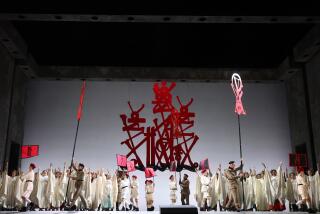All the Markings of a Great Opera--Including Enrico Caruso
- Share via
Opera is a strange beast. With the head of a poet and the body of a symphony orchestra, it survives in a fantastic corral, like a tapestry unicorn, cared for by people who like their life written large. Although opera might initially elicit the image of the icy passion of Wagnerites or the plush melodies of Verdi in Venice or Milan, one has only to mention the name Fitzcarraldo to remember the lengths to which that aficionado went to build an opera house in the middle of Latin America.
So the only surprise about the premise of the Cuban writer Mayra Montero’s exquisite tale, “The Messenger,” is that no one before her has grafted operatic excess onto Latin magic.
A true story: In 1920, drawn by a financial offer as grand as “Aida” itself, the great tenor Enrico Caruso sailed to Cuba to sing nine operas. On the night of June 13, a bomb, presumably aimed at the Italian singer, exploded in Havana’s Teatro Nacional. Covered in plaster dust, the 47-year old Caruso, still dressed as the noble Egyptian soldier Radames ran into the street. Several days later, he reappeared, finished out his contract, then departed for New York, Naples and his death in the fall.
Onto the good fortune of those missing days, Montero has fashioned a mystery and a love story as incredible as it is compelling. With the deftest of fingers, she pushes Caruso across the street and into the kitchen of the Hotel Inglaterra. And there, stunned by the sound of the blast and the sure knowledge that this disaster is bound up in her own fate, stands the young dressmaker Aida Cheng. Ignorant of who the singer is, Aida takes Caruso by the hand and leads him to the house of her godfather, the powerful santero, Jose de Calazan. Five months before, Calazan had communed with his Creole gods and cast the ekuele, a charm that invoked a song of thunder and the voice of a doomed man who would come to his goddaughter. When he comes, you must bring him to me immediately, Calazan tells her. “Bring him so you won’t be tainted. He is not coming to die; he is already dead when he comes.”
And, indeed, Caruso may as well be dead. With pains in his stomach, aches in his head and a lump in his divine throat satanized by years of cigarettes, Caruso is further plagued with a Cuban sweat that gives him a perpetual, cadaverous look. Yet with the courage that comes from the acceptance of fate, Aida guides the most famous singer in the world to the protection of Calazan and his brotherhood as well as to the powerful Chinese magic of her smoky father Yuan Pei Fu.
But “The Messenger” is much more than a thriller about a young girl saving the life of a man marked by death. For Aida herself is lost. A 27-year-old widow, her only daughter recently dead, Aida is also a cultural orphan without enough Chinese, Spanish or Congo blood to connect her to any one society. And yet Montero fashions her into a Creole warrior, whose very mixture gives her power. “She was mixed: nothing excites men more than that mix: Chinese eyes and hair and that great mulatta body.”
Even more than the excitement, however, the mixed identity frees her from fear and obligation to devote herself to this “dead” man. Years later, as she tells her story to Enriqueta, the daughter born from the bomb, in the mixture of languages stirred so forcefully by translator Edith Grossman (that expert messenger of the words of the great Colombians Gabriel Garcia Marquez and Alvaro Mutis), she understands the glory of adding an Italian mixture to her family blood.
“I’ve told you the story,” she tells her daughter, “knowing that deep down you already knew it. . . . Your memories and mine came together and walked together all these months.” It’s a deathbed trio (tenor offstage in the wings) that would have done Verdi proud.
More to Read
The biggest entertainment stories
Get our big stories about Hollywood, film, television, music, arts, culture and more right in your inbox as soon as they publish.
You may occasionally receive promotional content from the Los Angeles Times.










